Do not trust websites claiming you have Bitcoins from a cloud mining platform
Phishing/ScamAlso Known As: Bitcoin Mining scam website
Get free scan and check if your device is infected.
Remove it nowTo use full-featured product, you have to purchase a license for Combo Cleaner. Seven days free trial available. Combo Cleaner is owned and operated by RCS LT, the parent company of PCRisk.com.
What kind of scam is "Bitcoin Mining"?
While inspecting spam emails, we discovered the "Bitcoin Mining" scam. This scheme is promoted on the Web. It claims that the user has been inactive on this automatic Bitcoin cloud mining platform for a long time – however, the amount of cryptocurrency mined can be retrieved.
It must be stressed that all these claims are false; they are used to deceive victims into disclosing their personal and financial data. Although, scams of this ilk may also target cryptowallet log-in credentials.
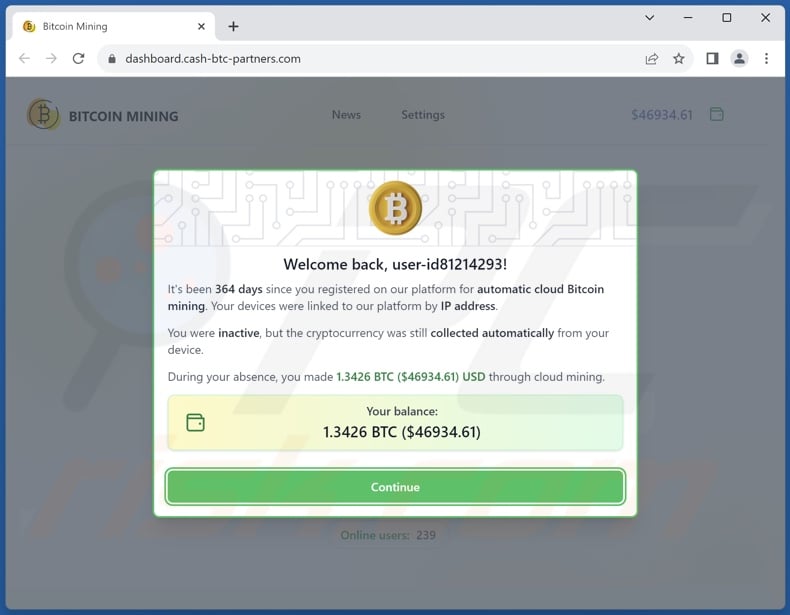
"Bitcoin Mining" scam overview
The scam webpage states that the user has been inactive on the "automatic cloud Bitcoin mining" platform they registered for 364 days ago. This service has linked the user's devices via their IP address. 1.3426 BTC (Bitcoin cryptocurrency) was generated during the period of inactivity, and it is possible to retrieve this sum. The amount is listed as worth 46862.11 USD, which is accurate to the conversion rate at the time of writing.
It must be emphasized that all the information provided by this scam is false and in no way associated with any legitimate service providers or platforms.
This scam targets personally identifiable details and financial data such as credit card numbers. It is noteworthy that scams of this kind may also aim to trick users into providing their cryptocurrency wallet log-in credentials.
To summarize, victims of scams like "Bitcoin Mining" may experience severe privacy issues, significant financial losses, and even identity theft.
If you have disclosed your private data (e.g., ID card details, passport photos/scans, credit card numbers, etc.) – immediately contact the appropriate authorities. However, if you have disclosed your log-in credentials – change the passwords of all possibly exposed accounts and inform their official support without delay.
| Name | Bitcoin Mining scam website |
| Threat Type | Phishing, Scam, Social Engineering, Fraud |
| Fake Claim | 1.3426 Bitcoins were generated on the cloud mining platform that the user has registered on. |
| Related Domains | trustminingpro[.]cc, father-mining[.]top, fopelimis[.]top, fart-mining[.]top, fastpromining[.]net, bestmining-prof[.]top, dashboard.cash-btc-partners[.]com (hosting "Bitcoin Mining" scam), fedumining[.]top, grabmoneymakers-362375.musicbats[.]com, cashcrazestream-368168.bnblaunch[.]com, cashoutexplorer-102015.musicbats[.]com, topamining[.]top (sites promoted via spam emails). |
| Detection Names (dashboard.cash-btc-partners[.]com) | Combo Cleaner (Phishing), Cluster25 (Phishing), ESET (Malware), Fortinet (Phishing), Kaspersky (Phishing), Full List Of Detections (VirusTotal) |
| Serving IP Address (dashboard.cash-btc-partners[.]com) | 104.21.83.248 |
| Spam Promoted Domain VT Detections and Serving IP Addresses | grabmoneymakers-362375.musicbats[.]com (94.142.138.17), cashcrazestream-368168.bnblaunch[.]com (94.142.138.17), cashoutexplorer-102015.musicbats[.]com (94.142.138.17) |
| Distribution methods | Compromised websites, rogue online pop-up ads, potentially unwanted applications. |
| Damage | Loss of sensitive private information, monetary loss, identity theft, possible malware infections. |
| Malware Removal (Windows) |
To eliminate possible malware infections, scan your computer with legitimate antivirus software. Our security researchers recommend using Combo Cleaner. Download Combo CleanerTo use full-featured product, you have to purchase a license for Combo Cleaner. 7 days free trial available. Combo Cleaner is owned and operated by RCS LT, the parent company of PCRisk.com. |
Cryptocurrency-themed scam examples
We have investigated thousands of scams; "Brad Garlinghouse Crypto Giveaway", "Ledger Data Damage Error: 0x0m3Ck8n", "Apple Crypto Giveaway", "BlockChain scam", "Bittrex Crypto Giveaway", "ShibaInu AirDrop", and "Congratulations You just received TetherUSDT" are just some examples of cryptocurrency-centric ones.
The Web is full of schemes that promise and warn of various things. The end goal is always the same – to generate revenue at victims' expense.
How did I open a scam website?
We found several spam emails promoting the "Bitcoin Mining" phishing scam. These letters are multilingual. The known samples were in English, Dutch, French, and Polish. However, variants in other languages are likely.
The spam messages promise over 45 thousand USD to the recipients and instruct them to follow the provided links. While each of the emails has a link to a different site, they all redirect to the same "Bitcoin Mining" scam-running page (dashboard.cash-btc-partners[.]com).
It is pertinent to mention that this scheme may be endorsed using other methods as well. Scam pages can be force-opened the moment a site that uses rogue advertising networks is accessed. Alternatively, rogue websites can generate redirects to such webpages when hosted content (e.g., buttons, text input fields, ads, links, etc.) is clicked or otherwise interacted with.
Intrusive ads and spam browser notifications also promote online scams. Additionally, mistyping a website's URL can result in a redirect (or a redirection chain leading) to a deceptive webpage. Adware can also display ads or force-open sites that endorse scams.
How to avoid visiting scam websites?
We strongly advise caution with incoming emails, PMs/DMs, SMSes, and other messages. Attachments or links found in suspect/irrelevant mail must not be opened, as they can be deceptive or even malicious.
Another recommendation is to be vigilant when browsing since fake and dangerous online content usually appears legitimate and harmless. Intrusive advertisements and spam notifications are an example; despite their innocuous appearance – they redirect to unreliable and questionable sites (e.g., scam-promoting, gambling, pornography, etc.).
To avoid receiving undesirable browser notifications – do not permit suspicious webpages to deliver them (i.e., do not click "Allow", "Allow Notifications", etc.). Instead, ignore or deny notification delivery from such pages (i.e., select "Block", "Block Notifications", etc.).
We advise against using websites offering pirated content or other questionable services (e.g., Torrenting, illegal streaming/downloading, etc.), as they are typically monetized via rogue advertising networks. Furthermore, pay attention to URLs and enter them with care.
To prevent bundled/harmful software from infiltrating the system – download only from official/verified sources and treat installations with caution (e.g., read terms, use "Custom/Advanced" settings, opt out of all additions). If your computer is already infected, we recommend running a scan with Combo Cleaner Antivirus for Windows to automatically eliminate all threats.
Appearance of "Bitcoin Mining" scam (GIF):
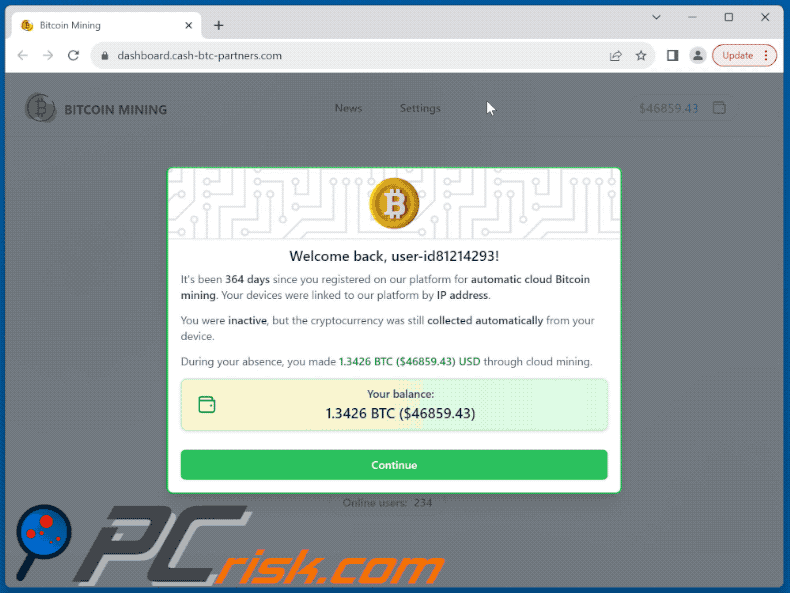
Text presented in the "Bitcoin Mining" scam:
Welcome back, user-id81214293!
It's been 364 days since you registered on our platform for automatic cloud Bitcoin mining. Your devices were linked to our platform by IP address.
You were inactive, but the cryptocurrency was still collected automatically from your device.
During your absence, you made 1.3426 BTC ($46862.11) USD through cloud mining.
Your balance:
1.3426 BTC ($46862.11)
Continue
Screenshots of spam emails promoting the "Bitcoin Mining" scam:
Sample 1:
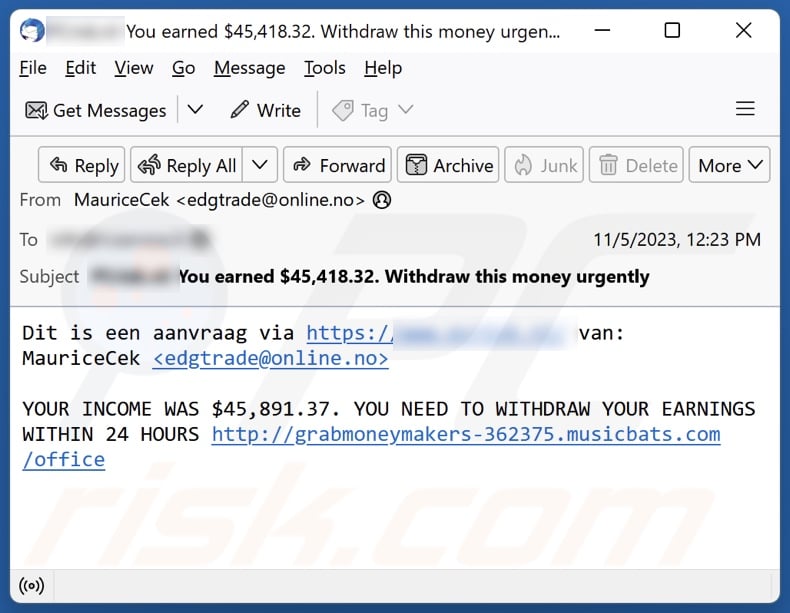
Text presented in this email:
Subject: ********: You earned $45,418.32. Withdraw this money urgently
Dit is een aanvraag via hxxps://www.********/ van:
MauriceCek ;
YOUR INCOME WAS $45,891.37. YOU NEED TO WITHDRAW YOUR EARNINGS WITHIN 24 HOURS hxxp://grabmoneymakers-362375.musicbats[.]com/office
Sample 2:
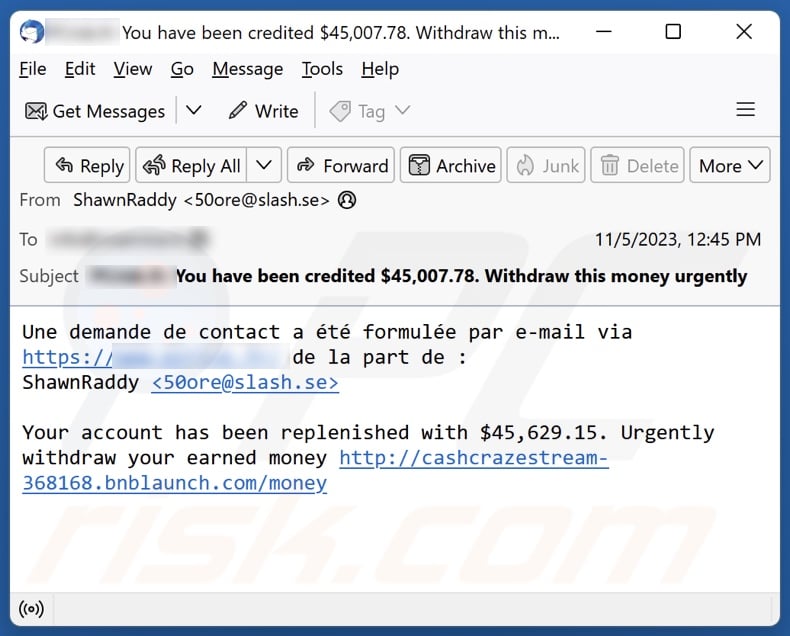
Text presented in this email:
Subject: ********: You have been credited $45,007.78. Withdraw this money urgently
Une demande de contact a été formulée par e-mail via hxxps://www.********/ de la part de :
ShawnRaddy ;
Your account has been replenished with $45,629.15. Urgently withdraw your earned money hxxp://cashcrazestream-368168.bnblaunch[.]com/money
Sample 3:
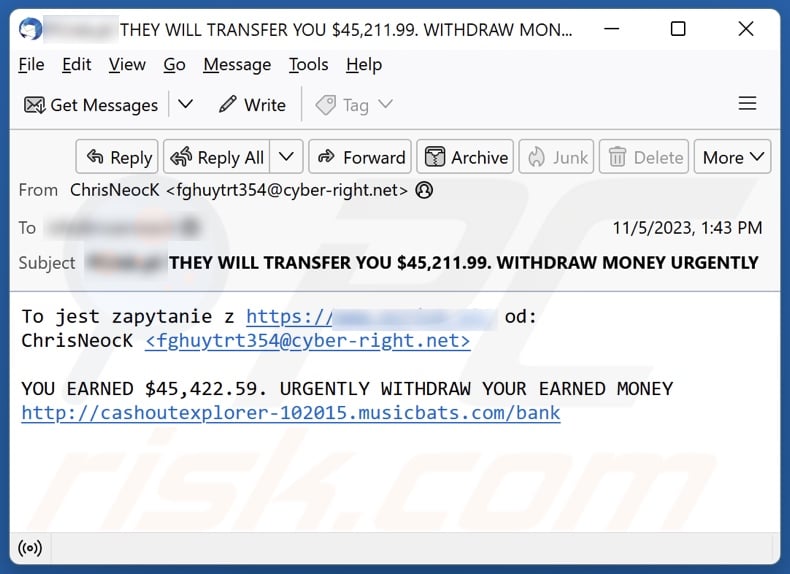
Text presented in this email:
Subject: ********: THEY WILL TRANSFER YOU $45,211.99. WITHDRAW MONEY URGENTLY
To jest zapytanie z hxxps://www.********/ od:
ChrisNeocK ;
YOU EARNED $45,422.59. URGENTLY WITHDRAW YOUR EARNED MONEY hxxp://cashoutexplorer-102015.musicbats[.]com/bank
Sample 4:
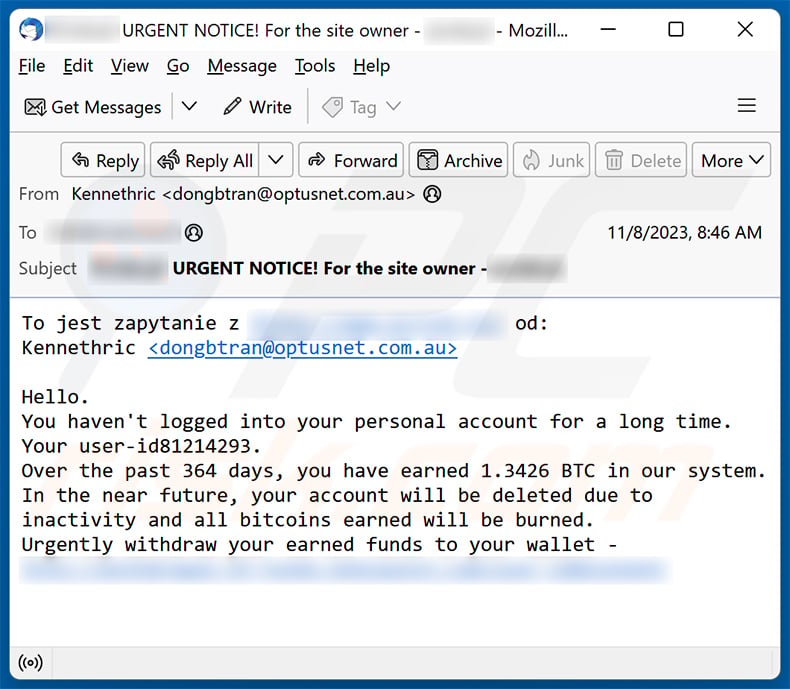
Text presented within:
Subject: ********: URGENT NOTICE! For the site owner - ********
Hello.
You haven't logged into your personal account for a long time.
Your user-id81214293.
Over the past 364 days, you have earned 1.3426 BTC in our system.
In the near future, your account will be deleted due to inactivity and all bitcoins earned will be burned.
Urgently withdraw your earned funds to your wallet -
Sample 5:
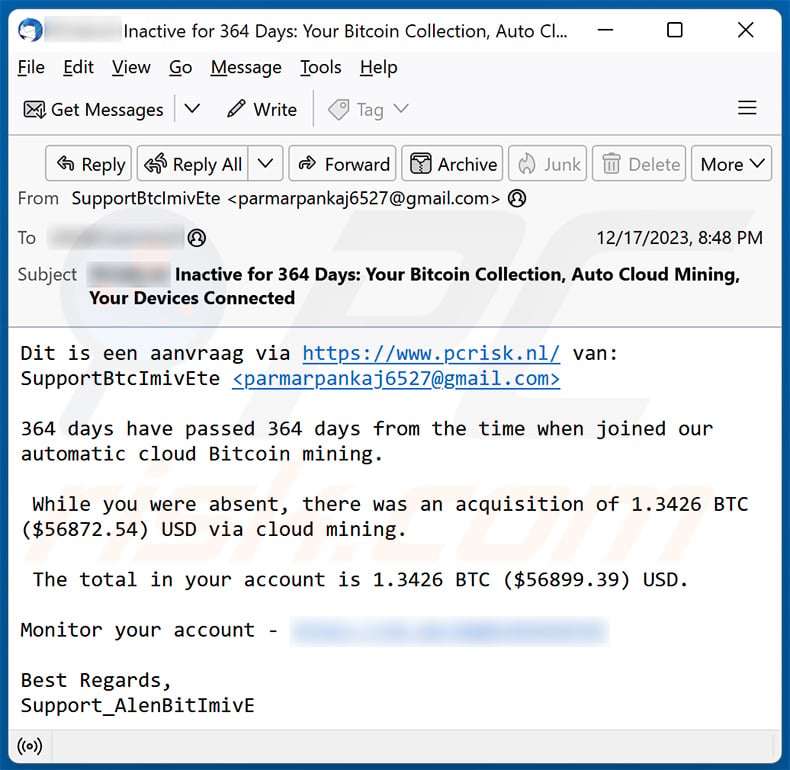
Text presented within:
Subject: - Inactive for 364 Days: Your Bitcoin Collection, Auto Cloud Mining, Your Devices Connected
364 days have passed 364 days from the time when joined our automatic cloud Bitcoin mining.
While you were absent, there was an acquisition of 1.3426 BTC ($56872.54) USD via cloud mining.
The total in your account is 1.3426 BTC ($56899.39) USD.
Monitor your account - -
Best Regards,
Support_AlenBitImivE
Sample 6:
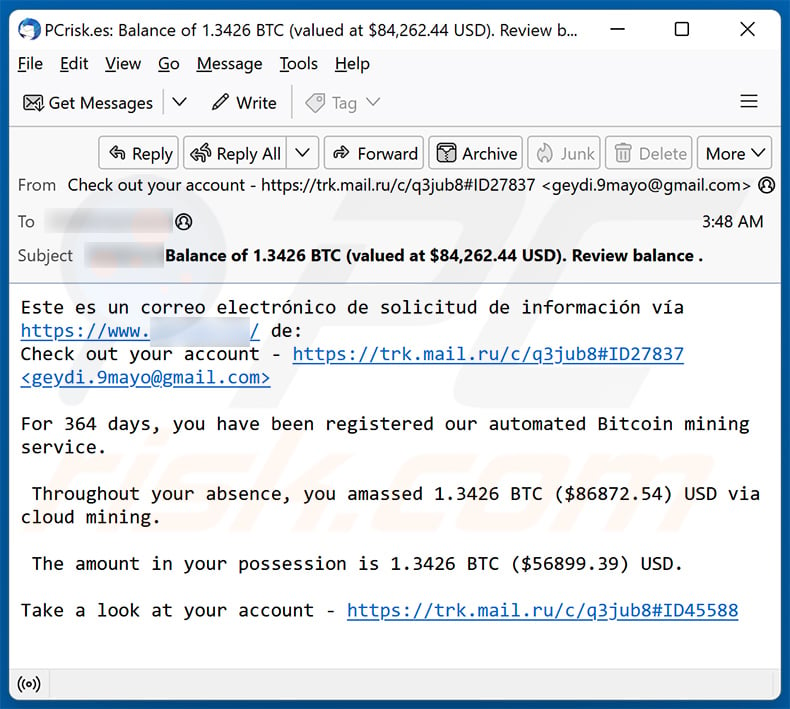
Text presented within:
Subject: - Balance of 1.3426 BTC (valued at $84,262.44 USD). Review balance .
For 364 days, you have been registered our automated Bitcoin mining service.
Throughout your absence, you amassed 1.3426 BTC ($86872.54) USD via cloud mining.
The amount in your possession is 1.3426 BTC ($56899.39) USD.
Take a look at your account -
Sample 7:
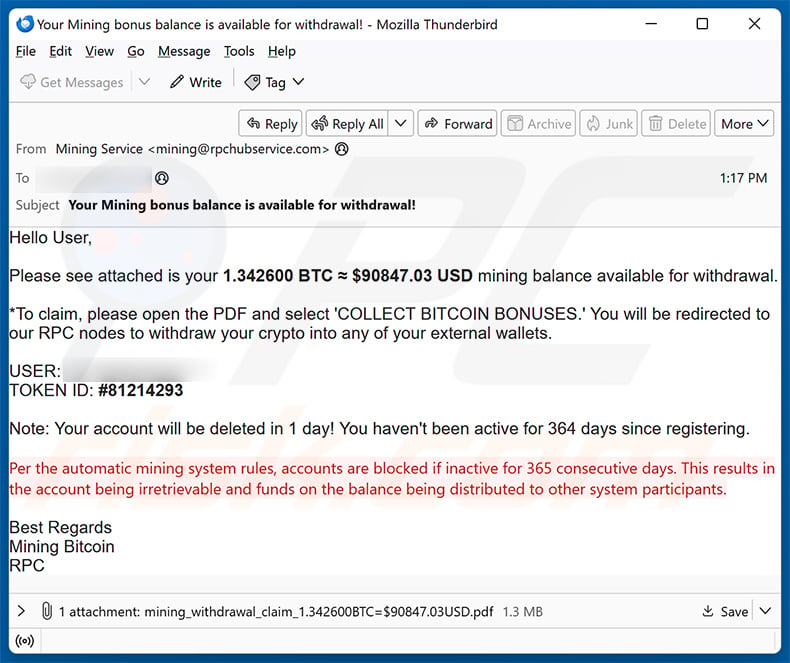
Text presented within:
Subject: Your Mining bonus balance is available for withdrawal!
Hello User,
Please see attached is your 1.342600 BTC ≈ $90847.03 USD mining balance available for withdrawal.
*To claim, please open the PDF and select 'COLLECT BITCOIN BONUSES.' You will be redirected to our RPC nodes to withdraw your crypto into any of your external wallets.
USER: -
TOKEN ID: #81214293Note: Your account will be deleted in 1 day! You haven't been active for 364 days since registering.
Per the automatic mining system rules, accounts are blocked if inactive for 365 consecutive days. This results in the account being irretrievable and funds on the balance being distributed to other system participants.
Best Regards
Mining Bitcoin
RPC
Sample 8:
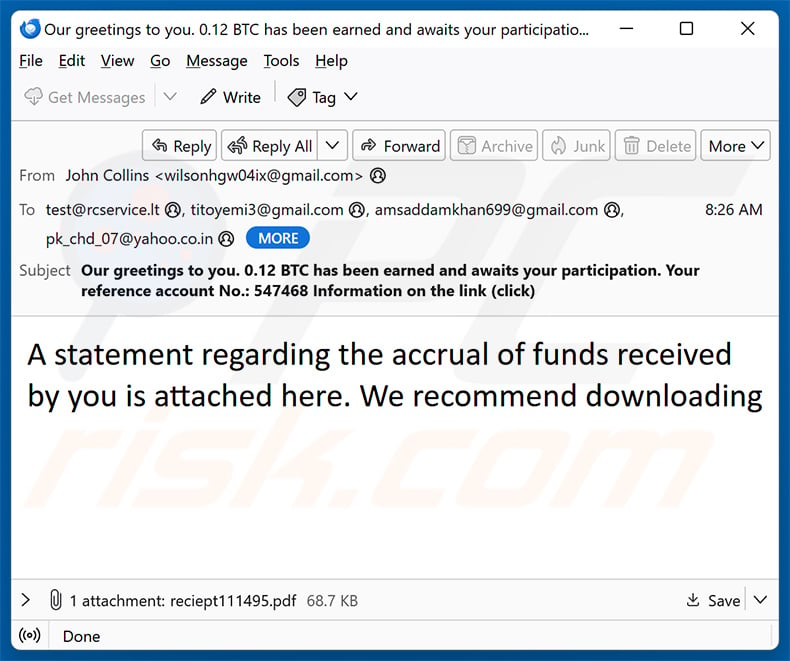
Text presented within:
Subject: Our greetings to you. 0.12 BTC has been earned and awaits your participation. Your reference account No.: 547468 Information on the link (click)
A statement regarding the accrual of funds received by you is attached here. We recommend downloading
Screenshot of the attached PDF document redirecting users to the scam page:
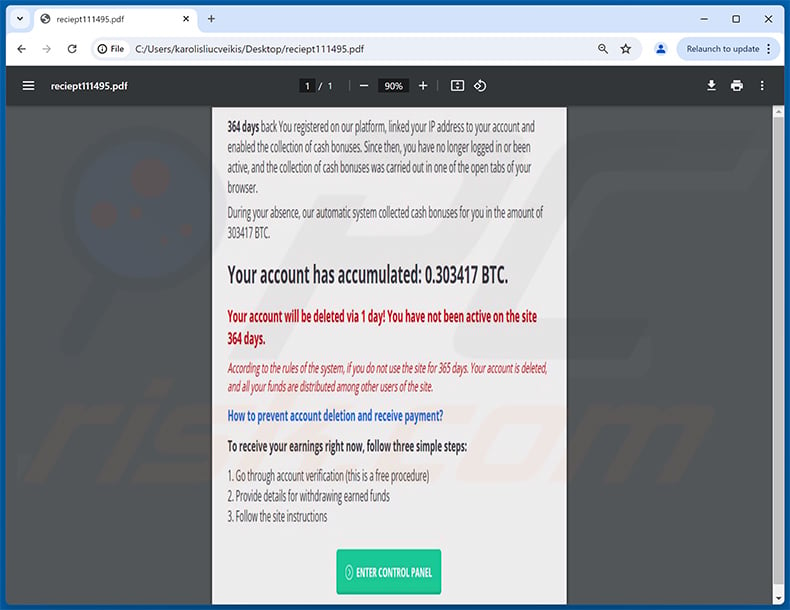
Sample 9:
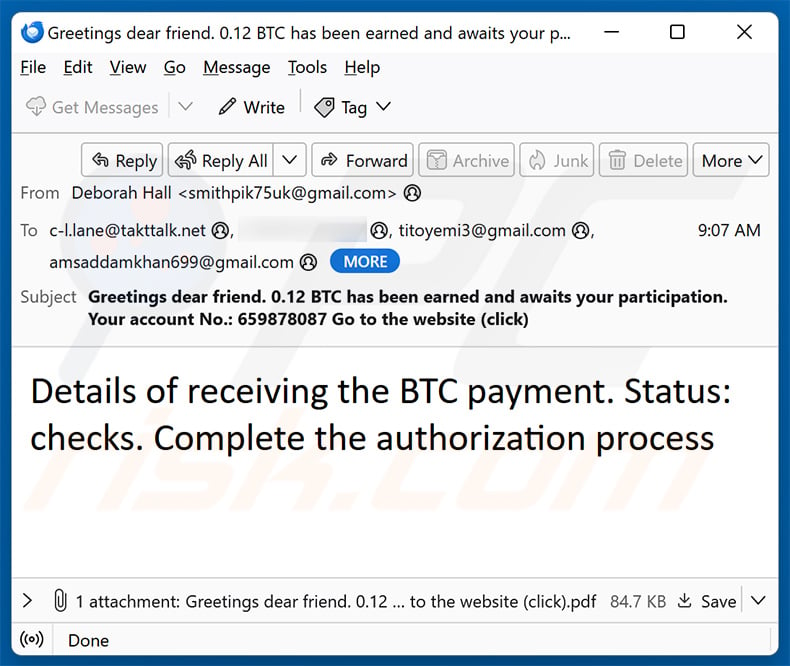
Text presented within:
Subject: Greetings dear friend. 0.12 BTC has been earned and awaits your participation. Your account No.: 659878087 Go to the website (click)
Details of receiving the BTC payment. Status: checks. Complete the authorization process
Screenshot of the attached PDF document redirecting users to the scam page:
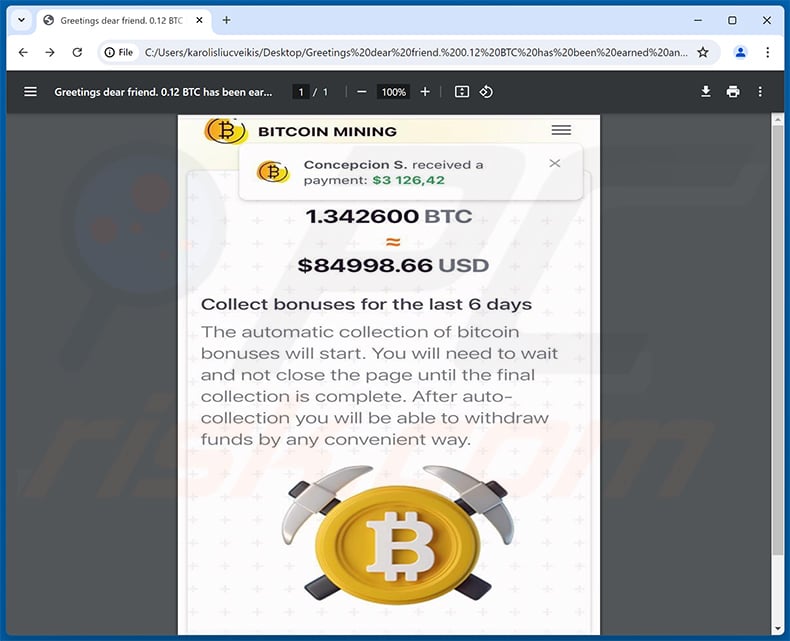
Sample 10:
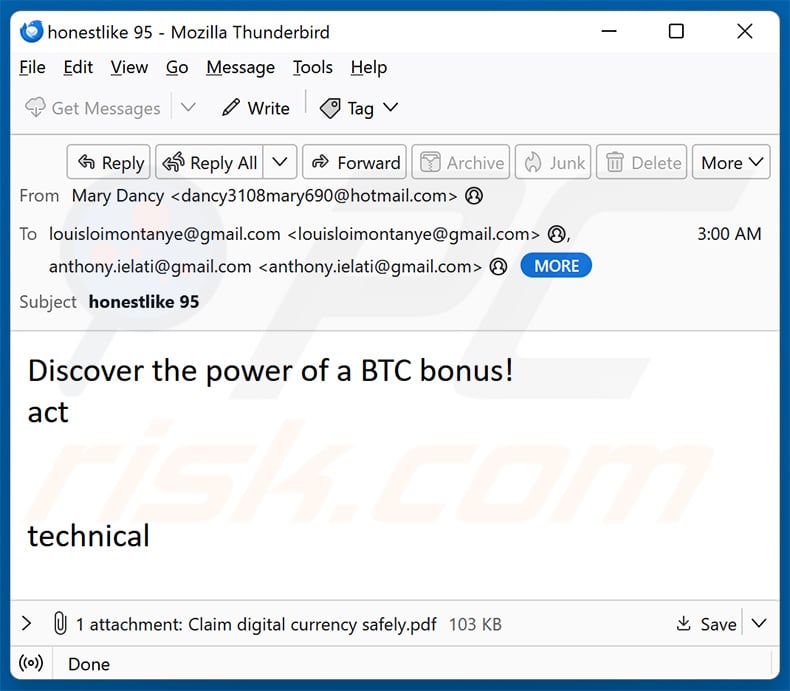
Text presented within:
Subject: honestlike 95
Discover the power of a BTC bonus!
acttechnical
Screenshot of the attached PDF document redirecting users to the scam page:

Sample 11:
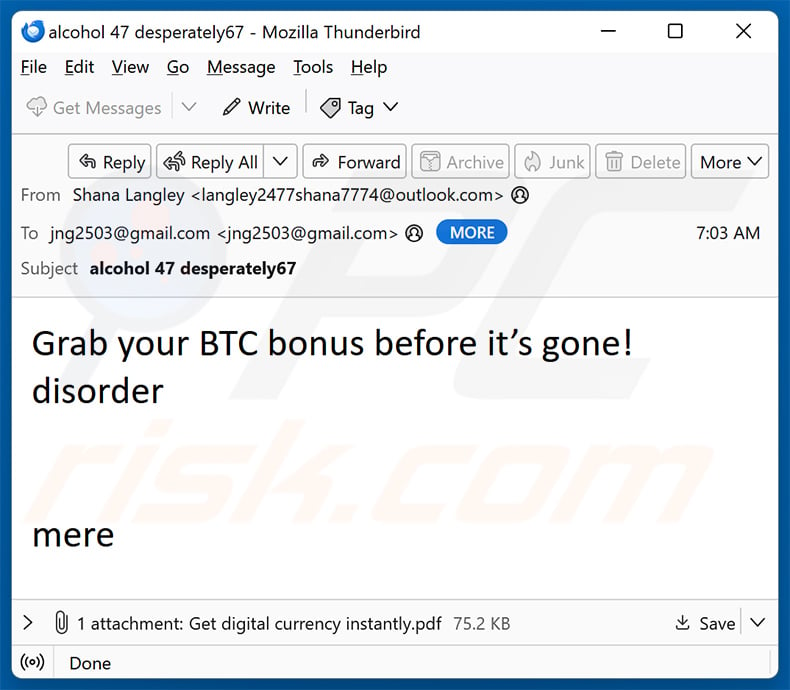
Text presented within:
Subject: alcohol 47 desperately67
Grab your BTC bonus before it’s gone!
disordermere
Screenshot of the attached PDF document redirecting users to the scam page:

Instant automatic malware removal:
Manual threat removal might be a lengthy and complicated process that requires advanced IT skills. Combo Cleaner is a professional automatic malware removal tool that is recommended to get rid of malware. Download it by clicking the button below:
DOWNLOAD Combo CleanerBy downloading any software listed on this website you agree to our Privacy Policy and Terms of Use. To use full-featured product, you have to purchase a license for Combo Cleaner. 7 days free trial available. Combo Cleaner is owned and operated by RCS LT, the parent company of PCRisk.com.
Quick menu:
- What is Bitcoin Mining scam website?
- How to identify a pop-up scam?
- How do pop-up scams work?
- How to remove fake pop-ups?
- How to prevent fake pop-ups?
- What to do if you fell for a pop-up scam?
How to identify a pop-up scam?
Pop-up windows with various fake messages are a common type of lures cybercriminals use. They collect sensitive personal data, trick Internet users into calling fake tech support numbers, subscribe to useless online services, invest in shady cryptocurrency schemes, etc.
While in the majority of cases these pop-ups don't infect users' devices with malware, they can cause direct monetary loss or could result in identity theft.
Cybercriminals strive to create their rogue pop-up windows to look trustworthy, however, scams typically have the following characteristics:
- Spelling mistakes and non-professional images - Closely inspect the information displayed in a pop-up. Spelling mistakes and unprofessional images could be a sign of a scam.
- Sense of urgency - Countdown timer with a couple of minutes on it, asking you to enter your personal information or subscribe to some online service.
- Statements that you won something - If you haven't participated in a lottery, online competition, etc., and you see a pop-up window stating that you won.
- Computer or mobile device scan - A pop-up window that scans your device and informs of detected issues - is undoubtedly a scam; webpages cannot perform such actions.
- Exclusivity - Pop-up windows stating that only you are given secret access to a financial scheme that can quickly make you rich.
Example of a pop-up scam:

How do pop-up scams work?
Cybercriminals and deceptive marketers usually use various advertising networks, search engine poisoning techniques, and shady websites to generate traffic to their pop-ups. Users land on their online lures after clicking on fake download buttons, using a torrent website, or simply clicking on an Internet search engine result.
Based on users' location and device information, they are presented with a scam pop-up. Lures presented in such pop-ups range from get-rich-quick schemes to fake virus scans.
How to remove fake pop-ups?
In most cases, pop-up scams do not infect users' devices with malware. If you encountered a scam pop-up, simply closing it should be enough. In some cases scam, pop-ups may be hard to close; in such cases - close your Internet browser and restart it.
In extremely rare cases, you might need to reset your Internet browser. For this, use our instructions explaining how to reset Internet browser settings.
How to prevent fake pop-ups?
To prevent seeing pop-up scams, you should visit only reputable websites. Torrent, Crack, free online movie streaming, YouTube video download, and other websites of similar reputation commonly redirect Internet users to pop-up scams.
To minimize the risk of encountering pop-up scams, you should keep your Internet browsers up-to-date and use reputable anti-malware application. For this purpose, we recommend Combo Cleaner Antivirus for Windows.
What to do if you fell for a pop-up scam?
This depends on the type of scam that you fell for. Most commonly, pop-up scams try to trick users into sending money, giving away personal information, or giving access to one's device.
- If you sent money to scammers: You should contact your financial institution and explain that you were scammed. If informed promptly, there's a chance to get your money back.
- If you gave away your personal information: You should change your passwords and enable two-factor authentication in all online services that you use. Visit Federal Trade Commission to report identity theft and get personalized recovery steps.
- If you let scammers connect to your device: You should scan your computer with reputable anti-malware (we recommend Combo Cleaner Antivirus for Windows) - cyber criminals could have planted trojans, keyloggers, and other malware, don't use your computer until removing possible threats.
- Help other Internet users: report Internet scams to Federal Trade Commission.
Frequently Asked Questions (FAQ)
What is an online scam?
Online scams are deceptive messages designed to trick users into performing specific actions. For example, victims can be deceived into making monetary transactions, disclosing private information, calling fake support lines, purchasing products, subscribing to services, downloading/installing software, and so on.
What is the purpose of online scams?
Online scams are used to generate revenue for scammers. Cyber criminals profit primarily by obtaining funds through deception, abusing or selling private data, promoting content (e.g., websites, products, services, software, etc.), and spreading malware.
I have provided my personal information when tricked by an online scam, what should I do?
If you have disclosed account credentials – change the passwords of all possibly compromised accounts and inform their official support. And if you have provided other private information (e.g., ID card details, passport photos/scans, credit card numbers, etc.) – contact the corresponding authorities.
Why do I encounter online scams?
The "Bitcoin Mining" scam has been noted being promoted via spam emails. However, online scams are also endorsed through redirects caused by sites utilizing rogue advertising networks, mistyped URLs, spam browser notifications, intrusive ads, or installed adware.
Will Combo Cleaner protect me from online scams?
Combo Cleaner is designed to scan visited sites and detect rogue, scam, and malicious ones. Hence, should you enter such a webpage – you will be warned immediately, and further access to it will be blocked.
Share:

Tomas Meskauskas
Expert security researcher, professional malware analyst
I am passionate about computer security and technology. I have an experience of over 10 years working in various companies related to computer technical issue solving and Internet security. I have been working as an author and editor for pcrisk.com since 2010. Follow me on Twitter and LinkedIn to stay informed about the latest online security threats.
PCrisk security portal is brought by a company RCS LT.
Joined forces of security researchers help educate computer users about the latest online security threats. More information about the company RCS LT.
Our malware removal guides are free. However, if you want to support us you can send us a donation.
DonatePCrisk security portal is brought by a company RCS LT.
Joined forces of security researchers help educate computer users about the latest online security threats. More information about the company RCS LT.
Our malware removal guides are free. However, if you want to support us you can send us a donation.
Donate
▼ Show Discussion